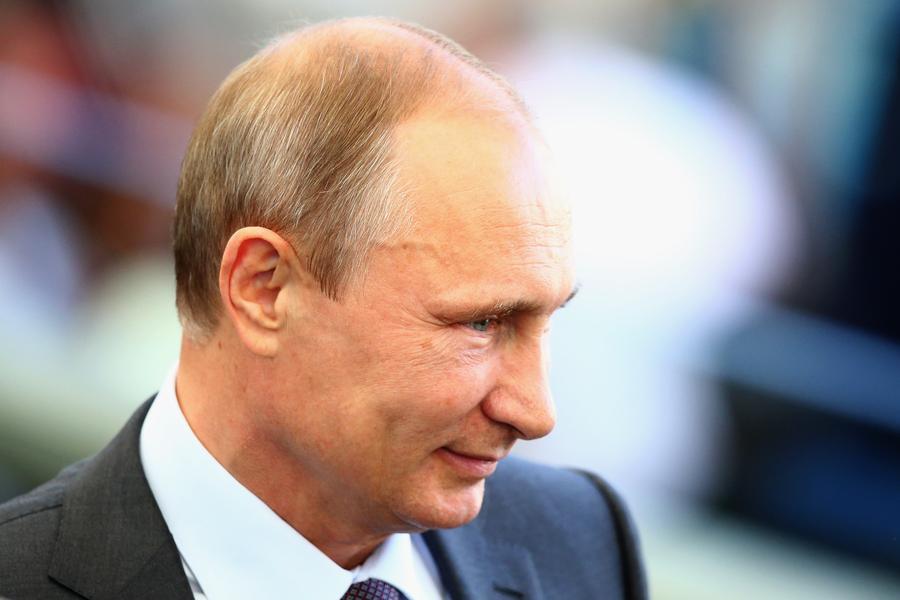Russia's 'humanitarian' mission to Ukraine is likely prelude to an invasion, NATO warns


A free daily email with the biggest news stories of the day – and the best features from TheWeek.com
You are now subscribed
Your newsletter sign-up was successful
Early Tuesday, Russia said it has sent a convoy of about 280 trucks carrying food, medicine, and other supplies toward the Ukraine border. The destination is the Ukrainian city of Luhansk, controlled by pro-Russia separatists and under siege by Ukrainian troops, and the convoy is at least theoretically part of a humanitarian mission overseen by the Red Cross. NATO isn't buying it, and Kiev is nervous.
On Monday, European Commission President José Manuel Barroso called Russian President Vladimir Putin and "warned against any unilateral military actions in Ukraine, under any pretext, including humanitarian," the EU said. The Kremlin gave its side of the conversation, in which Putin had "focused attention on the catastrophic consequences of the military operation" by Ukraine and pointedly "noted that the Russian side, in cooperation with representatives of the International Committee of the Red Cross, is sending a humanitarian convoy to Ukraine."
Ukrainian President Petro Poroshenko agreed to a Red Cross mission, but only if it involved the European Union as well as Russia. The ICRC said Monday that "the practical details of this operation need to be clarified before this initiative can move forward."
The Week
Escape your echo chamber. Get the facts behind the news, plus analysis from multiple perspectives.

Sign up for The Week's Free Newsletters
From our morning news briefing to a weekly Good News Newsletter, get the best of The Week delivered directly to your inbox.
From our morning news briefing to a weekly Good News Newsletter, get the best of The Week delivered directly to your inbox.
NATO Secretary General Anders Fogh Rasmussen told Reuters on Monday that he judged there to be "a high probability" that Russia will stage a military intervention, noting as Ukraine gets closer and closer to taking control of Donetsk and Luhansk, Russia's state-run media has increasingly warned about the humanitarian crisis in the primarily Russian-speaking Ukrainian cities. "We see the Russians developing the narrative and the pretext for such an operation under the guise of a humanitarian operation, and we see a military build-up that could be used to conduct such illegal military operations in Ukraine," Rasmussen added.
NATO has estimated that Russia has about 20,000 troops and ample heavy weaponry amassed at the Russia-Urkaine border, primed to invade. On Monday, Ukraine said there are about 45,000 Russia troops, plus 160 tanks, 1,360 armored vehicles, 390 artillery systems, up to 150 truck-mounted missile launchers, 192 fighter jets, and 137 attack helicopters. Western intelligence hasn't verified those numbers.
A free daily email with the biggest news stories of the day – and the best features from TheWeek.com
Peter has worked as a news and culture writer and editor at The Week since the site's launch in 2008. He covers politics, world affairs, religion and cultural currents. His journalism career began as a copy editor at a financial newswire and has included editorial positions at The New York Times Magazine, Facts on File, and Oregon State University.
-
 The cabbage comeback
The cabbage comebackThe Week Recommends Gone are the days of ‘WWII boiled cabbage recipes’. The humble vegetable is enjoying a resurgence
-
 Fine food on a budget
Fine food on a budgetThe Week Recommends Excellent value eateries with the Michelin inspectors’ seal of approval
-
 Where to go for the 2027 total solar eclipse
Where to go for the 2027 total solar eclipseThe Week Recommends Look to the skies in Egypt, Spain and Morocco
-
 British warship repels 'largest Houthi attack to date' in the Red Sea
British warship repels 'largest Houthi attack to date' in the Red SeaSpeed read Western allies warn of military response to Iranian-backed Yemeni rebels if attacks on ships continue
-
 Houthi rebels claim Red Sea ship attacks
Houthi rebels claim Red Sea ship attacksspeed read Iran-backed Yemeni group vows to escalate aggression towards Israel-linked vessels in revenge for Gaza war
-
 Israel plans next phase of Gaza war as first hostages released
Israel plans next phase of Gaza war as first hostages releasedSpeed read After four-day ceasefire 'we will not stop' until destruction of Hamas, says Israel
-
 Mob storms Russian airport 'looking for Jews'
Mob storms Russian airport 'looking for Jews'Speed Read Plane from Israel surrounded by rioters chanting antisemitic slogans after landing in Russia's Dagestan region
-
 Tuberville's military promotions block is upending lives, combat readiness, 3 military branch chiefs say
Tuberville's military promotions block is upending lives, combat readiness, 3 military branch chiefs saySpeed Read
-
 Ukraine's counteroffensive is making incremental gains. Does it matter in the broader war?
Ukraine's counteroffensive is making incremental gains. Does it matter in the broader war?Speed Read
-
 US commissions first-ever Navy ship in a foreign port
US commissions first-ever Navy ship in a foreign portSpeed Read
-
 British spy chief, Wagner video suggest Prigozhin is alive and freely 'floating around'
British spy chief, Wagner video suggest Prigozhin is alive and freely 'floating around'Speed Read
